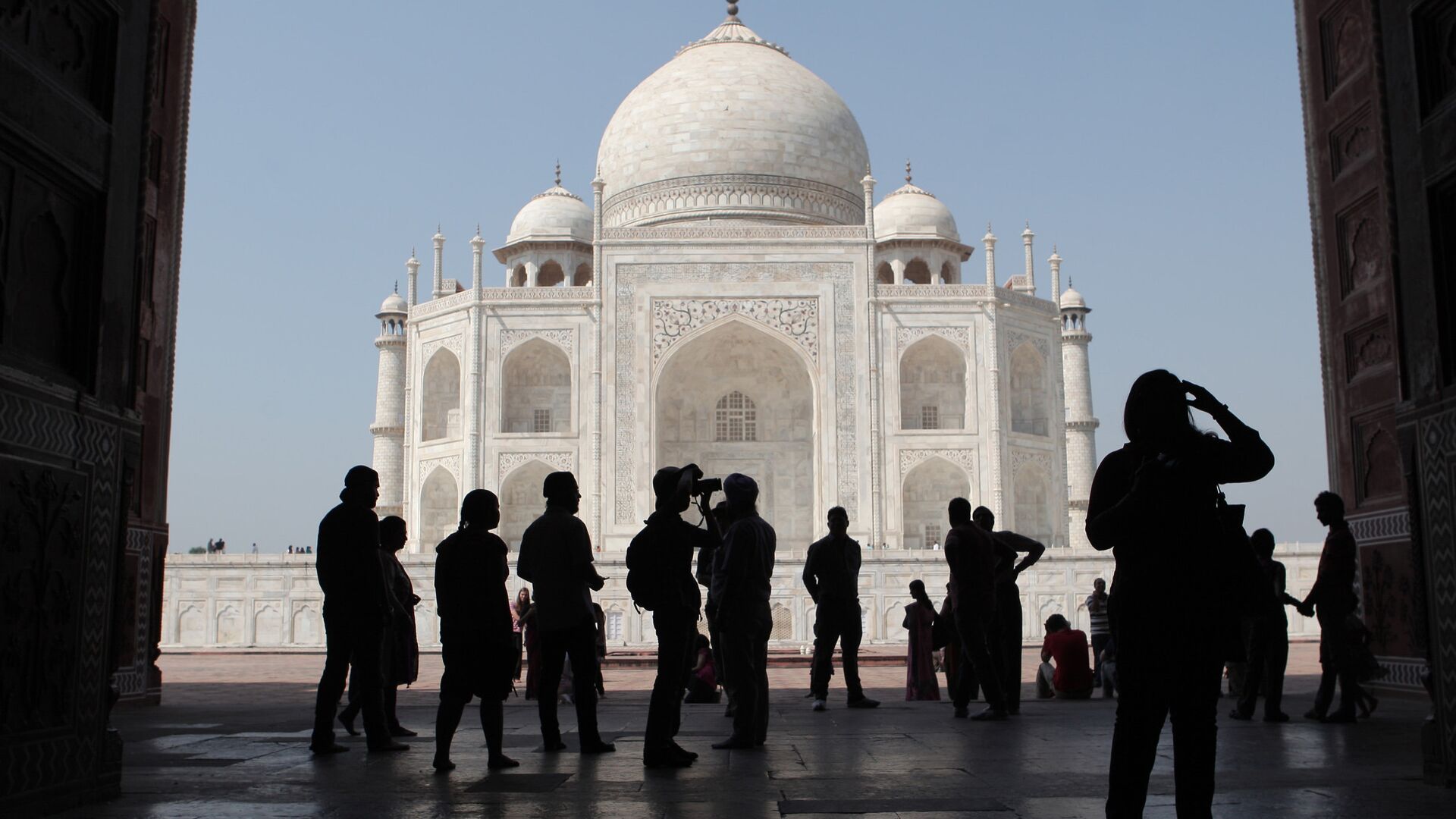https://sputnikglobe.com/20220512/tomorrow-you-will-want-to-visit-judges-chambers-court-trashes-plea-to-open-taj-mahals-rooms-1095461954.html
'Tomorrow You Will Want to Visit Judges' Chambers: Court Trashes Plea to Open Taj Mahal's Rooms
'Tomorrow You Will Want to Visit Judges' Chambers: Court Trashes Plea to Open Taj Mahal's Rooms
Sputnik International
Located in Agra in the state of Uttar Pradesh, the architectural wonder was named a UNESCO World Heritage Site in 1983 for being "the jewel of Muslim art in... 12.05.2022, Sputnik International
2022-05-12T14:01+0000
2022-05-12T14:01+0000
2022-07-19T10:43+0000
taj mahal
taj mahal
taj mahal
uttar pradesh
https://cdn1.img.sputnikglobe.com/img/105169/92/1051699241_0:203:2465:1590_1920x0_80_0_0_647077fa66210194b05b0be225f44af2.jpg
The Allahabad High Court of India on Thursday dismissed a petition requesting it to open 22 rooms in the world-famous, 17th-century monument, the Taj Mahal, to ascertain if there were some Hindu deities' idols kept inside. The petitioner, Rajneesh Singh, a Bharatiya Janata Party (BJP) member, wanted the court to set up a fact-finding team to establish the "true history" of the Taj Mahal under "freedom of information". He believes that the history of one of India's cultural trademarks has been taught wrong. In his plea, Singh stated that a total of 22 rooms of the monument have remained sealed. And "many Hindu worshippers" believe that a Lord Shiva temple exists in those rooms.Built between 1632 and 1653 by the Mughal Emperor Shah Jahan in memory of his beloved wife Mumtaz Mahal, Taj Mahal is one of the favourite tourist destinations in India, popularly described as a "Monument to Love". Decorated in the Indo-Islamic tradition with references to earlier Mughal architecture, the building houses the tombs of the loving couple.The Archaeological Survey of India (ASI) has already stated that the rooms at the Mughal-era monument remain sealed because of security reasons.Rebuking the petitioner further on his objective to make such a plea, the court said: "Go and do your research. Do a Masters [degree], do a PhD. Then choose such a topic, and if any institute disallows you to research such a topic. Then come to us.""What you are seeking is an exploration of facts through a committee. You have no right to do that, and it does not fall under the remit of the Right To Information Act," the court stated."The petitioner has called upon us to give a verdict on a completely non-justiciable issue," the Allahabad High Court bench concluded.
uttar pradesh
Sputnik International
feedback@sputniknews.com
+74956456601
MIA „Rossiya Segodnya“
2022
Deexa Khanduri
https://cdn1.img.sputnikglobe.com/img/07e4/0c/1e/1081607388_0:0:961:960_100x100_80_0_0_e9e931b8c1e18fb41f3074e2145d7a3a.jpg
Deexa Khanduri
https://cdn1.img.sputnikglobe.com/img/07e4/0c/1e/1081607388_0:0:961:960_100x100_80_0_0_e9e931b8c1e18fb41f3074e2145d7a3a.jpg
News
en_EN
Sputnik International
feedback@sputniknews.com
+74956456601
MIA „Rossiya Segodnya“
Sputnik International
feedback@sputniknews.com
+74956456601
MIA „Rossiya Segodnya“
Deexa Khanduri
https://cdn1.img.sputnikglobe.com/img/07e4/0c/1e/1081607388_0:0:961:960_100x100_80_0_0_e9e931b8c1e18fb41f3074e2145d7a3a.jpg
taj mahal, taj mahal, taj mahal, uttar pradesh
taj mahal, taj mahal, taj mahal, uttar pradesh
'Tomorrow You Will Want to Visit Judges' Chambers: Court Trashes Plea to Open Taj Mahal's Rooms
14:01 GMT 12.05.2022 (Updated: 10:43 GMT 19.07.2022) Deexa Khanduri
Sputnik correspondent
Located in Agra in the state of Uttar Pradesh, the architectural wonder was named a UNESCO World Heritage Site in 1983 for being "the jewel of Muslim art in India and one of the universally admired masterpieces of the world's heritage".
The Allahabad High Court of India on Thursday dismissed a petition requesting it to open 22 rooms in the world-famous, 17th-century monument, the
Taj Mahal, to ascertain if there were some Hindu deities' idols kept inside.
The petitioner, Rajneesh Singh, a Bharatiya Janata Party (BJP) member, wanted the court to set up a fact-finding team to establish the "true history" of the Taj Mahal under "freedom of information". He believes that the history of one of India's cultural trademarks has been taught wrong. In his plea, Singh stated that a total of 22 rooms of the monument have remained sealed. And "many Hindu worshippers" believe that a
Lord Shiva temple exists in those rooms.
Built between 1632 and 1653 by the Mughal Emperor Shah Jahan in memory of his beloved wife Mumtaz Mahal, Taj Mahal is one of the
favourite tourist destinations in India, popularly described as a "Monument to Love". Decorated in the Indo-Islamic tradition with references to earlier Mughal architecture, the building houses the tombs of the loving couple.
Reacting to the plea, the Bench of Justices DK Upadhyay and Subhash Vidyarthi reprimanded the petitioner and said: "Tomorrow you'll come and ask us to go to the chambers of the honourable judges? Please, don't make a mockery of the Public Interest Litigation (PIL) system."
The Archaeological Survey of India (ASI) has already stated that the rooms at the Mughal-era monument remain sealed because of security reasons.
Rebuking the petitioner further on his objective to make such a plea, the court said: "Go and do your research. Do a Masters [degree], do a PhD. Then choose such a topic, and if any institute disallows you to research such a topic.
Then come to us."
"What you are seeking is an exploration of facts through a committee. You have no right to do that, and it does not fall under the remit of the Right To Information Act," the court stated.
"The petitioner has called upon us to give a verdict on a completely non-justiciable issue," the Allahabad High Court bench concluded.


